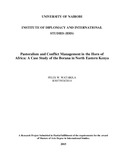| dc.description.abstract | Generally, the study is about pastoralism and conflict management in the Horn of Africa using Borana of Kenya as a case study. It examines the causes and impact of resource conflicts in HoA then conflict resolution mechanisms in Borana Community and finally concluded with a tranche of recommendations to make conflict resolution mechanisms more effective. The study sets out two hypotheses namely that Political and traditional practices are a hindrance to the conflict management mechanisms among the Borana community and secondly the weak normative and Institutional mechanism largely explain the persistence of pastoral conflicts in Borana Community. The study which depended largely on primary and secondary data with intermediate use of maps and tables including thematic approach to present the information was situated within the realism theory.
This study found out that the conflicts and their impacts on the one hand, and the ill-advised and often non-consultative, top-down interventions by governments and other development actors have undermined the confidence of communities on the future of pastoralism as a livelihood and land use system. This has the result of creating hopelessness within these communities, which know that pastoralism is the most appropriate way for them to make use of the ASALs and at the same time see many restrictions and constraints placed in their path by inappropriate policies and interventions as well as other natural factors that they are increasingly unable to manage.
This study demonstrates analytically the socio-political and socio-legal aspects that characterize the customary and formal justice institutions and shows the existence of tension between them that needs to be addressed through a legal framework that accommodates the two in one legal pluralism. This is to allow the effective operations of customary justice systems without fear of contradicting the formal systems, and to have the customary restorative justice systems decisions of conflict resolutions and range resources management as binding upon the state.
Lastly, the study has shown that the Borana of Northern Kenya have continued to depend on their customary systems for dispensation of justice and it has served them well. The formal justice system of the state, in this case Kenya need to engage this customary justice institution constructively and meaningfully to provide a formal recognition framework for it, so that its decisions on resources management tenure and conflict resolutions are binding upon the state or any other party. | en_US |

